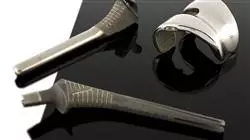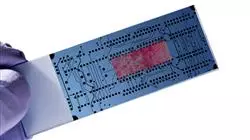University certificate
The world's largest faculty of engineering”
Introduction to the Program
This program will allow you to delve into the latest developments in biodevices and biosensors, conveying the most recent advances in Nanotechnology and Tissue Engineering"

Although science fiction has often gone too far in its predictions or taken paths that have not been realized in reality, there is one element with which it has not gone astray: biomedical implants. This type of health grafts are beginning to have numerous applications and in the near future will be one of the fundamental branches of engineering.
For this reason, it is necessary to update the engineer, so that he can incorporate into his professional practice all the tools of this field that will allow them to be at the forefront in the present and in the future. Therefore, this Postgraduate diploma in Biomedical Implants and In Vivo Devices offers the most cutting-edge knowledge on issues such as biomechanics, delving into biomechanical implants, biomaterials and their applications and Tissue Engineering, which will explore issues such as stem cells, tissue regeneration and gene therapy, among many others.
Professionals will also have a 100% online teaching methodology at their disposal that will allow them to balance their work with their studies, since it adapts to their personal circumstances: they will be able to choose how, when and where to advance in this program. In addition, a high-level teaching staff will accompany you throughout the learning process, using numerous multimedia educational resources such as procedural videos, analysis of real cases, theoretical and practical exercises, master classes and interactive summaries.
Learn more about in vivo devices, one of the most important branches of Biomedical Engineering, thanks to TECH 100% online teaching methodology, with which you can balance your work with your studies without any inconveniences or interruptions"
This Postgraduate diploma in Biomedical Implants and In Vivo Devices contains the most complete and up-to-date educational program on the market. Its most notable features are:
- The development of case studies presented by experts in Biomedical Engineering
- The graphic, schematic, and practical contents with which they are created, provide scientific and practical information on the disciplines that are essential for professional practice
- Practical exercises where the self-assessment process can be carried out to improve learning
- Its special emphasis on innovative methodologies
- Theoretical lessons, questions to the expert, debate forums on controversial topics, and individual reflection assignments
- Content that is accessible from any fixed or portable device with an Internet connection
Videos, real clinical cases, theoretical and practical exercises... The latest educational resources are waiting for you, along with an elite teaching staff, so that you can reach your professional goals quickly"
The program’s teaching staff includes professionals from sector who contribute their work experience to this training program, as well as renowned specialists from leading societies and prestigious universities.
The multimedia content, developed with the latest educational technology, will provide the professional with situated and contextual learning, i.e., a simulated environment that will provide immersive training programmed to train in real situations.
This program is designed around Problem-Based Learning, whereby the professional must try to solve the different professional practice situations that arise during the academic year. For this purpose, the student will be assisted by an innovative interactive video system created by renowned and experienced experts.
Incorporate the most cutting-edge advances in gene therapy and biomaterials into your professional practice, and become a leading engineer in this area"

Learn about the principles of biofluids and Nanotechnology in this program, which will bring you closer to the health and engineering discipline with the best future prospects: Biomedical Engineering"
Why study at TECH?
TECH is the world’s largest online university. With an impressive catalog of more than 14,000 university programs available in 11 languages, it is positioned as a leader in employability, with a 99% job placement rate. In addition, it relies on an enormous faculty of more than 6,000 professors of the highest international renown.

Study at the world's largest online university and guarantee your professional success. The future starts at TECH”
The world’s best online university according to FORBES
The prestigious Forbes magazine, specialized in business and finance, has highlighted TECH as “the world's best online university” This is what they have recently stated in an article in their digital edition in which they echo the success story of this institution, “thanks to the academic offer it provides, the selection of its teaching staff, and an innovative learning method aimed at educating the professionals of the future”
A revolutionary study method, a cutting-edge faculty and a practical focus: the key to TECH's success.
The most complete study plans on the university scene
TECH offers the most complete study plans on the university scene, with syllabuses that cover fundamental concepts and, at the same time, the main scientific advances in their specific scientific areas. In addition, these programs are continuously being updated to guarantee students the academic vanguard and the most in-demand professional skills. In this way, the university's qualifications provide its graduates with a significant advantage to propel their careers to success.
TECH offers the most comprehensive and intensive study plans on the current university scene.
A world-class teaching staff
TECH's teaching staff is made up of more than 6,000 professors with the highest international recognition. Professors, researchers and top executives of multinational companies, including Isaiah Covington, performance coach of the Boston Celtics; Magda Romanska, principal investigator at Harvard MetaLAB; Ignacio Wistumba, chairman of the department of translational molecular pathology at MD Anderson Cancer Center; and D.W. Pine, creative director of TIME magazine, among others.
Internationally renowned experts, specialized in different branches of Health, Technology, Communication and Business, form part of the TECH faculty.
A unique learning method
TECH is the first university to use Relearning in all its programs. It is the best online learning methodology, accredited with international teaching quality certifications, provided by prestigious educational agencies. In addition, this disruptive educational model is complemented with the “Case Method”, thereby setting up a unique online teaching strategy. Innovative teaching resources are also implemented, including detailed videos, infographics and interactive summaries.
TECH combines Relearning and the Case Method in all its university programs to guarantee excellent theoretical and practical learning, studying whenever and wherever you want.
The world's largest online university
TECH is the world’s largest online university. We are the largest educational institution, with the best and widest online educational catalog, one hundred percent online and covering the vast majority of areas of knowledge. We offer a large selection of our own degrees and accredited online undergraduate and postgraduate degrees. In total, more than 14,000 university degrees, in eleven different languages, make us the largest educational largest in the world.
TECH has the world's most extensive catalog of academic and official programs, available in more than 11 languages.
Google Premier Partner
The American technology giant has awarded TECH the Google Google Premier Partner badge. This award, which is only available to 3% of the world's companies, highlights the efficient, flexible and tailored experience that this university provides to students. The recognition as a Google Premier Partner not only accredits the maximum rigor, performance and investment in TECH's digital infrastructures, but also places this university as one of the world's leading technology companies.
Google has positioned TECH in the top 3% of the world's most important technology companies by awarding it its Google Premier Partner badge.
The official online university of the NBA
TECH is the official online university of the NBA. Thanks to our agreement with the biggest league in basketball, we offer our students exclusive university programs, as well as a wide variety of educational resources focused on the business of the league and other areas of the sports industry. Each program is made up of a uniquely designed syllabus and features exceptional guest hosts: professionals with a distinguished sports background who will offer their expertise on the most relevant topics.
TECH has been selected by the NBA, the world's top basketball league, as its official online university.
The top-rated university by its students
Students have positioned TECH as the world's top-rated university on the main review websites, with a highest rating of 4.9 out of 5, obtained from more than 1,000 reviews. These results consolidate TECH as the benchmark university institution at an international level, reflecting the excellence and positive impact of its educational model.” reflecting the excellence and positive impact of its educational model.”
TECH is the world’s top-rated university by its students.
Leaders in employability
TECH has managed to become the leading university in employability. 99% of its students obtain jobs in the academic field they have studied, within one year of completing any of the university's programs. A similar number achieve immediate career enhancement. All this thanks to a study methodology that bases its effectiveness on the acquisition of practical skills, which are absolutely necessary for professional development.
99% of TECH graduates find a job within a year of completing their studies.
Postgraduate Diploma in Biomedical Implants and In Vivo Devices
Biomedical implants are medical devices designed to be implanted in the human body to replace or improve the function of a damaged or missing organ or body structure. These implants can be permanent or temporary and can be used for a variety of medical treatments.
In vivo devices are devices prescribed by a physician that are placed inside the human body and remain there for extended periods of time. These devices are used for a variety of medical purposes, such as monitoring heart rate, administering medications, regulating appetite and managing pain.
Biomedical implants and In vivo devices are designed to be compatible with the human body and not to be rejected by the immune system. These devices are made of specialized materials, such as biocompatible plastics, metals and ceramics.
In vivo implants and devices are designed to deliver targeted treatment to a specific part of the body, making them very effective in the treatment of chronic diseases. In addition, treatment efficacy can be monitored with the in vivo device.
Although these devices represent a major advance in medicine, there are certain risks associated with their use that must be weighed before implantation. Patients requesting a biomedical implant or in vivo device should discuss the risks and benefits with their physician and make sure they fully understand the potential side effects or complications.
The goal of the program is to provide students with advanced knowledge in the design and development of biomedical implants and devices, as well as their evaluation and use in humans. Students will learn about the materials used in the fabrication of implants and devices, as well as challenges related to biological compatibility. They will be taught about the sterilization processes and quality standards required for these devices.







